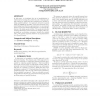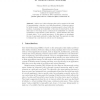141 search results - page 4 / 29 » Fuzzy Kanerva-based function approximation for reinforcement... |
AAMAS
2007
Springer
13 years 7 months ago
2007
Springer
In this paper, we investigate the use of parallelization in reinforcement learning (RL), with the goal of learning optimal policies for single-agent RL problems more quickly by us...
ATAL
2005
Springer
14 years 1 months ago
2005
Springer
Reinforcement learning problems are commonly tackled with temporal difference methods, which use dynamic programming and statistical sampling to estimate the long-term value of ta...
ICCBR
2005
Springer
14 years 1 months ago
2005
Springer
CBR is one of the techniques that can be applied to the task of approximating a function over high-dimensional, continuous spaces. In Reinforcement Learning systems a learning agen...
ESANN
2007
13 years 9 months ago
2007
The eligibility trace is one of the most used mechanisms to speed up reinforcement learning. Earlier reported experiments seem to indicate that replacing eligibility traces would p...
AAAI
2006
13 years 9 months ago
2006
Reinforcement learning problems are commonly tackled with temporal difference methods, which attempt to estimate the agent's optimal value function. In most real-world proble...


